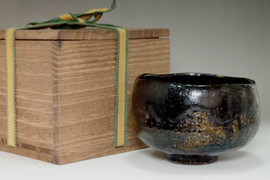Raku 3rd Donyu Antique RAKU teabowl #5175
- SKU:
- 5175
- Shipping:
- Calculated at Checkout
width: approx. 12.6 cm (4 61⁄64 in)
height: approx. 7.5 cm (2 61⁄64 in)
weght: 356g (w/ box 657g)
condition: fixed, hair line crack
This is a black Raku teabowl handed down in an old family in Wakayama Prefecture. The box is inscribed with "Raku 3rd Donyu black teabowl titled 'KAGURA,' writing by Omotesenke 9th Ryoryosai."
Kagura refers to a traditional Japanese ceremonial performance that embodies sacred artistry dedicated to the gods. It is a ritual featuring songs and dances, held to invite the presence of deities or receive divine messages, known as oracles.
Raku Kichizaemon 3rd Donyu
1599-1656
male
raku pottery
Donyu, who was Jokei’s first son (Doraku being the 2nd) and a 2nd generation Raku-family descendant, went by the pseudonym or artist name Kichibe or Kichizaemon during his life, however, many people call him by his nickname ‘Nonko’.
Nobody clearly knows when Donyu began pottery making, however, he had enough time to learn pottery from his father, Jokei, and it’s thought that he also learned it from Honami Koetsu (a famous potter).
Donyu tried to develop a new raku ware style based on Rikyu-style tea bowls while incorporating his style and early Edo period trends.
It was considered that Koetsu developed the art style of Donyu.
The document ‘Honamikojoki’, written by Kosa, who was Koetsu’s adopted child, and Koho, Koetsu’s grandson, says that Donyu was the best potter, having exceptional skills and being a descendant of the Raku family, handed his tea bowls down to his offspring for them to learn the Raku family craft.
The document tells that Koetsu had a high opinion of Donyu.
However, it was difficult for Donyu to overcome his financial difficulties even though he was the best potter because the Raku pottery workshop was not oficial pottery workshop of Tokugawa during the feudal times.
There are clear differences between Chojiro’s tea bowls and Donyu’s tea bowls.
Chojiro’s tea bowls have a mat black glaze, on the other hand many of Donyu’s tea bowls have a glossy black glaze and are sometimes furnished with ornaments.
Donyu’s tea bowls are also bigger, however, thinner than Chojiro’s tea bowls. Chojiro’ bowls seem serious, modest and reserved, without flashy decorations while having a consistent form. On the other hand, Donyu’s tea bowls impress one with a sense of freedom in terms of artistic expression and flashiness, as Donyu likes to decorate his bowls and make them stand out.
There is an opinion that the nickname ‘Nonko’ originated from a flower vase which was gifted to Donyu from Sen no Sotan (a grandson of Sen no Rikyu). Sotan named the vase Nonko (possible meaning: self‐renunciation). Every time he went to visit Donyu, he would say ‘I am going to see Nonko’, which might mean that Nonko was his nickname for Donyu.
It is also said the nickname ‘Nonko’ originated from the early Edo period hairstyle trend ‘nonko’.




















